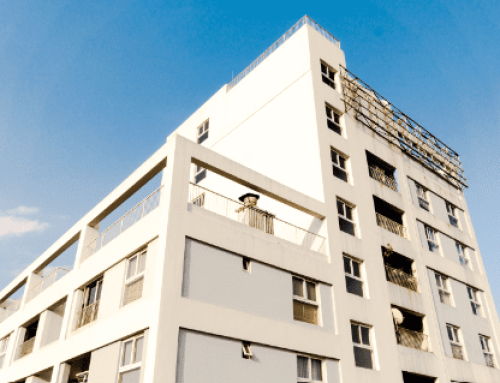Block property managers aren’t only just required to look after the building itself, they also have a duty to provide support to private landlords and tenants within the block of flats or apartments.
There are currently 19044 property management companies in the United Kingdom, all of which should have the best interests of their clients, which sometimes includes being responsible for monies and tenant issues or well-being.
A property manager should be able to manage all aspects of running a building, with maintenance, property inspections and health and safety being some of the first things that come to mind, but what kind of other support services can you expect from your block property manager?
In this guide, we’ll run through the different support services offered by a residential property management company.
What are property management support services?
As well as servicing the grounds and common areas, a block management company can also provide a number of support services. This includes Accounting, where they ensure all contractors are paid and monies collected. Furthermore, they can provide admin support such as service charge budgets and facilitating meetings between property managers.
Maintaining all of the financial records for the properties and developments they oversee is the responsibility of the accounts staff.
Financial management
The block manager is in charge of overseeing the building’s finances, which may involve collecting ground rent and service charges (we’ll take a close look at service charges later), making and adhering to maintenance and repair budgets, and managing various financial transactions involving contractors and other outside parties.
Communication and dispute resolution
It is the block manager’s duty to inform residents about building maintenance and repair issues. Being an excellent communicator is essential because this might be a difficult aspect of the work. It’s important to address complaints and issues promptly and effectively since residents want to feel as though their issues are acknowledged and addressed right away.
General administration
The property manager must make sure that all paperwork is in order before entrusting the management of a property to a property management company. The property manager is responsible for overseeing contracts for upkeep and repairs, complaints, construction, legal matters, money, and more.
All paperwork needs to be filed and easily located when needed. It is necessary to request, examine, and verify bids for remodelling and maintenance work. It is necessary to schedule appointments for prospective renters and tradespeople to visit the site. Invoices must be verified and work must be contracted out.
Telephone calls and emails
Answering calls and emails is a time-consuming task that falls under the administrative purview. Emails and phone calls are the primary methods used for task follow-up. Visits are scheduled over the phone.
Management of contracts
Contracts for maintenance and subscriptions need to be negotiated, completed, and overseen. Insurance claims and coverage documentation needs to be obtained. Hiring a caretaker can be necessary.
Information Technology
Office and property management tools, including Microsoft Office Professional and others, must be mastered by the property manager. The management software makes it possible to keep an eye on leases, contracts, rent collection, liquidity management, and the accounting and heating and utility invoice production.
Automating some tasks, like creating statements such as investment returns, rent statements, checklists, analysis, etc., is made possible by systematic computer registration and daily updates.
How are service charge budgets created?
Budgeting and expense allocation for Service Charge Accounts are essential. To maintain and oversee the common areas and facilities of the property, property managers or Resident Management Companies (RMCs) are required to develop a comprehensive budget. Included are utilities, cleaning services, repairs, insurance, and management costs.
Both anticipated and existing costs should be included in the budget. In order to ensure that leaseholders or tenants pay service charges proportionate to their property ownership, it should also be fair.
It is necessary to compute service fee contributions in a logical, consistent, and lawful manner. Changes to the budget or cost split should be promptly and fully disclosed to tenants or leaseholders. They will learn about their responsibilities for service charge accounts from this.
A budget and cost allocation are necessary for service charge accounts to be open, equitable, and responsible. It guarantees fair service charge payments to tenants and leaseholders, based on precise cost estimations. This helps with financing for block property management.
When establishing a service charge account, it is essential to collect and handle service charge funds in an open, responsible, and legal manner.
It helps guarantee that there is enough money available to pay for the costs listed in the budget and that service fee payments are only used for what they were meant to.
Looking for expert block property management services?
It doesn’t have to be a difficult and time-consuming procedure to manage residential properties. You can lower your stress when it comes to property management by partnering with a reliable, knowledgeable, and skilled block management team.
Scanlans offers a bespoke service for your property and tenancy needs.
Our team of fully qualified property professionals provides a dedicated service to ensure your block is well-managed and maintained, day-in, day-out. We’re also regulated by RICS and ARMA, so you know you’ll get quality service.
If you’re looking for professional block management services, then look no further than Scanlans Property Management.
Let’s chat! Contact our block property management experts today to get started.
Property management supports FAQs
Is property management worth it?
You don’t have to handle any of the property management paperwork. You don’t have to handle challenging circumstances like evictions or unpaid rent. Long-term financial savings can be achieved through efficient property management. The network of suppliers and trades that property managers have access to is also advantageous to you.
What does full property management include?
A property manager’s primary duties include acting as the landlord’s representative when dealing with tenants, making sure the property complies with legal requirements, industry standards, and paperwork, handling any issues pertaining to tenants, and overseeing property maintenance.
What does a management company do for a block of flats?
Companies that manage blocks of properties are not the same as those that manage residential properties. Budgeting and following the law are essential components of block management, as is ensuring that the service costs imposed benefit both the freeholder and the tenant.









